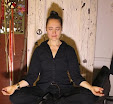
I may have a problem with the word L.O.V.E., do I? And if so, is it okay?
A big part of me is always hesitant to use the word as
generously as others.
Perhaps because as a yogini I have been
surrounded by it for too long. I always read about it for sure. I can not even say I hear it in yoga class because I foremost have a mat living room/Central Park bench yoga, mobile practice these days.
Or do I perhaps not L.O.V.E.?
Having had this on my mind for a while, I started noticing recently
that the word or let's say the concept of L. seemed to have begun to literally sneak into my yoga classes about two years ago; I found myself using the word as a teacher if in a round about way. Surprise!
For one and a half years, I was a wellness
consultant utilizing LV Chair Yoga and Self Hand Reflexology in harm reduction (then the city decided to not LOVE those who need it most despite the fact that there seemed additional funds and cut the funds, but that is another story).
I worked with a challenged minority population with long-term challenges, such as substance abuse, homelessness, mental illness, etc. I dislike using labels generally because they are limiting; anyone of us is more than a label. It was not a job in a yoga studio, and most of my work does not take place in yoga studios.
Getting to know my students, I found it most necessary to focus on the concept of "openness", as "being open
to ourselves, forgiving ourselves, being compassionate towards
ourselves" and then extending all that to others, so that we all have less stress and more balance and a better life - regardless how impossible that often seemed given the external circumstances. And that is when I realized in a way that I found my own way of talking about love.
Because yoga is yoga because of the breath, awareness of the chest area is very important; opening the chest area so the lungs can have space and we can breathe better. So there I was getting very close to "love." Speaking about the chest I had to mention the heart due to it's anatomical location in the chest. The heart is nestled between the lungs. But still, it was mostly coupled with openness as in spaciousness and in the same sentence with lungs and stress reduction. That is how it made sense to me the most. So I was indeed talking about love and possibly not ever uttering the big L word.
So being open to yourself and
therefore others (including lover, partner) and perhaps more so than anything, homeostasis is a
really good word for me at this point to describe LOVE. If I allow myself to return to balance (homeostasis) or work on it again and again, I will be open - and openness means love. And yes, I do not need to use the word love, if I do not want to just because I am a yoga teacher. By the way this is not a critique of those who do.
Now remember, openness can also mean being open to closing doors. Love is not a destination - unless we are speaking about these LOVE sculptures (see photos) - but it is a path that we choose over and over.
So could love really equal homeostasis or am I selling love short? I continued to indulge a little longer and decided to do a google search.
And, please, do remember that homeostasis is
compared to a tightrope dance; that is it requires commitment and that may mean simply letting go. L requires work, and the work may entail letting go or releasing or saying no; we need to get intelligent about the way we love...
This
is not an attempt to redefine love. So back to google. This
is what I found in an article in "Psychology Today." At the bottom of the page you will find the link.
And, hm it looks like I have made a valid point: "... in what could be called a state of ‘homeostasis’ – a
state of balance or equilibrium, where we feel physically and
emotionally ‘safe’ – our capacity to feel and express love is generally
greatest."
And as for modern city dwellers, oh no, "We’ve also
discussed what Todd Ritchey and I have
proposed (link is external)
is a dysfunctional ‘addictive’ drive, which arises from ‘evolutionary
mismatch’ effects that occur whenever people live in environments – such
as modern cities – that they are not biologically or evolutionarily
adapted for. The addictive drive tends to throw people
out of balance or equilibrium, into states of survival mode. Survival-mode states like
anxiety or
fear can become dysfunctionally reinforced in the
brain, we’ve proposed, because they trigger the release of
stress hormones that various lines of evidence suggest can deliver
unconscious
biochemical rewards to the brain. In this way, literal biochemical
addictions to distressing, survival-mode emotional states like anxiety
or fear can develop in nearly all of us. The addictive drive therefore
throws us
out of balance, into survival mode, and directly opposes the homeostatic drive, which is always seeking to bring us
into balance, or homeostasis.
What I want to propose in this post is that the homeostatic drive is, in effect, the force of love."
A+ according to the above. Love IS homeostasis. I must take out my mat now or reflex or simply do some breathwork because my day was a bit stressful, and I do not feel that loving right now and may also not be that lovable...
Many thanks to my students, who probably have no idea why I disappeared from one class to the next, and must have felt again abandoned. We had something very special. Thank you for your trust, thank you for giving yourself and me a chance. You continue to be in my heart, Juan, Jose, Deborah.



Blessings and namaste,
Birgit
https://www.psychologytoday.com/blog/the-embodied-mind/201302/love-valentine








